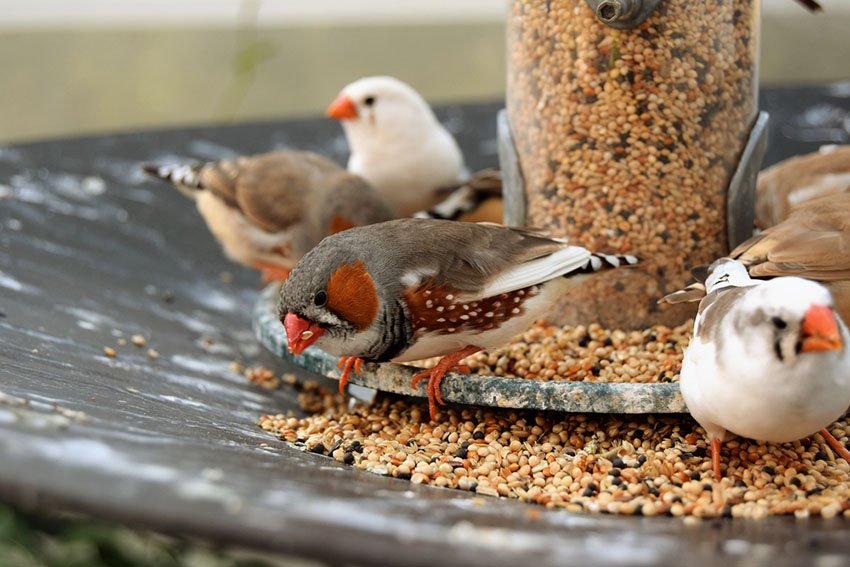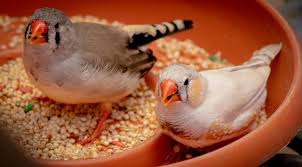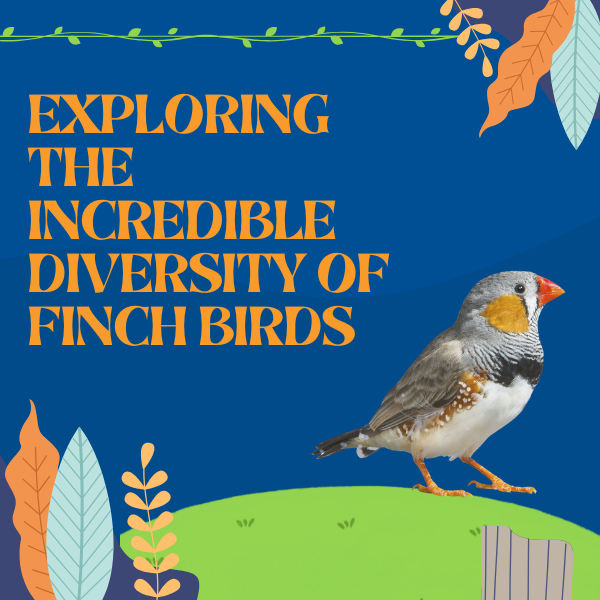When it comes to caring for your finch birds, understanding their dietary needs is crucial. This comprehensive guide will delve into the various aspects of finch bird food, ensuring your feathered friends thrive in a healthy environment. Whether you’re a new finch owner or looking to enhance your current feeding routine, this article will provide the insights you need.

Understanding Finch Dietary Needs
When it comes to ensuring the health and vitality of your finch birds, understanding their dietary needs is paramount. Finches, known for their vibrant colors and lively personalities, require a carefully balanced diet to support their high metabolic rates and active lifestyles. This section will delve deeper into the specific nutritional requirements of finches, offering insights that will enhance your ability to care for these delightful creatures effectively.
The Importance of a Balanced Diet
Finches are granivorous birds, meaning their diet primarily consists of seeds. However, to maintain optimal health, it’s crucial to provide a variety of food types that offer a full spectrum of nutrients. A balanced diet for finches is not just about meeting their caloric needs but ensuring they receive adequate proteins, fats, vitamins, and minerals.

Essential Components of a Finch’s Diet
- Seeds: As the cornerstone of a finch’s diet, seeds should be carefully selected to ensure nutritional completeness. A high-quality seed mix typically includes:
- Millet: A staple seed for finches, millet is rich in carbohydrates and provides the energy needed for their active lifestyle.
- Canary Seed: Known for its protein content, canary seed supports muscle development and maintenance.
- Sunflower Seeds: Although high in fat, sunflower seeds are a good source of essential fatty acids. They should be offered in moderation to prevent obesity.
- Pellets: Commercially available pellets are formulated to provide a balanced diet, compensating for any deficiencies in a seed-only diet. Pellets are enriched with vitamins and minerals, ensuring your finches receive a comprehensive nutrient profile.
- Fresh Fruits and Vegetables: These are crucial for providing vitamins and antioxidants. Recommended options include:
- Apples: Offer vitamin C and fiber. Ensure they are sliced into small, manageable pieces.
- Carrots: Rich in beta-carotene, carrots support healthy eyesight and immune function.
- Spinach and Broccoli: Both are excellent sources of vitamins A, C, and K, contributing to overall health and well-being.
It is important to introduce these gradually and monitor your finches for any adverse reactions.
- Live Food: Insects such as mealworms and crickets can be provided occasionally, particularly during breeding seasons. They offer a valuable protein boost, supporting egg production and chick development.
- Calcium Supplements: Essential for bone health and egg production, sources like cuttlefish bone or mineral blocks should always be available. Calcium is particularly vital for breeding females to prevent egg-binding.
Customizing the Diet for Specific Needs
Finches have varying dietary needs based on factors such as age, health status, and reproductive stage. Here are some considerations:
- Young Finches: Juveniles require higher protein levels to support growth. Supplement their diet with additional live food and high-protein pellets.
- Breeding Finches: Increase calcium intake to support egg production. A higher protein diet is also beneficial during this period.
- Senior Finches: Older finches may benefit from softer foods and easily digestible grains, ensuring they maintain their nutritional intake without digestive stress.
Monitoring and Adjusting the Diet
Regular observation of your finches’ eating habits is crucial. Adjust their diet based on their activity level, weight, and overall health. If a finch appears lethargic or shows signs of malnutrition, consult with a veterinarian specializing in avian care to adjust their diet accordingly.
Tips for Feeding Finch Birds
Feeding finch birds might seem straightforward, but to truly ensure their health and vitality, it’s essential to follow certain guidelines and tips. These small yet vibrant birds have specific dietary requirements that, when met, can lead to a long and healthy life. Whether you’re a seasoned bird enthusiast or a new finch owner, these expert tips will help you refine your feeding practices to better meet your finches’ needs.
1. Prioritize Variety in Their Diet
Just like humans, finches benefit from a varied diet. While seeds are a staple, incorporating different food types can prevent nutritional deficiencies:
- Rotate Seed Mixes: Use a mix of millet, canary seed, and nyjer to provide diverse nutrients.
- Introduce Fresh Produce: Offer small portions of fruits and vegetables, rotating them to keep meals interesting. Try apples, pears, carrots, and leafy greens.
2. Maintain Freshness and Cleanliness
Clean, fresh food and water are critical for your finches’ health:
- Daily Refresh: Replace water daily and clean food dishes to prevent bacterial growth.
- Monitor Food Storage: Store seeds and pellets in airtight containers in a cool, dry place to maintain freshness and prevent mold.
3. Observe and Adapt to Eating Habits
Understanding your finches’ eating patterns can help you tailor their diet more effectively:
- Monitor Consumption: Keep an eye on how much they eat to ensure they’re getting enough nutrients without overfeeding.
- Adjust for Preferences: If a certain food is consistently left uneaten, try altering the diet or method of presentation.
4. Be Mindful of Toxic Foods
Certain foods can be harmful to finches, so it’s crucial to know what to avoid:
- Avoid Avocado and Onion: These can be toxic to birds.
- Limit High-Fat Foods: While sunflower seeds are nutritious, offer them sparingly due to high fat content.
5. Supplement with Calcium and Vitamins
Ensure your finches receive all necessary nutrients, especially if they are breeding:
- Cuttlefish Bone: Provide cuttlefish bone or mineral blocks as a calcium source, crucial for eggshell production.
- Vitamins and Minerals: Consider adding vitamin supplements to water if your vet recommends it, especially during molting or breeding.
6. Implement a Consistent Feeding Routine
Consistency can help reduce stress and promote health:
- Regular Feeding Times: Offer food at the same time each day to establish a routine.
- Observe Changes: During molting or breeding, adjust the diet to meet increased nutritional needs.
7. Encourage Natural Foraging Behaviors
Stimulate your finches mentally and physically by mimicking natural feeding habits:
- Scatter Seeds: Occasionally scatter some seeds in their cage, encouraging them to forage.
- Use Foraging Toys: Introduce toys that challenge them to find hidden food.
8. Consult with Avian Veterinarians
Regular check-ups can help ensure your feeding practices are on the right track:
- Professional Guidance: Seek advice from avian vets to tailor diets to individual health needs.
- Nutritional Assessments: Have your vet evaluate your finch’s diet to ensure balance and adequacy.
Common Mistakes in Finch Feeding
Feeding finches might seem like a straightforward task, but there are several common mistakes that can adversely affect your birds’ health. Understanding these pitfalls is crucial for providing your finches with the best possible care. This section will explore these common feeding errors and offer practical solutions to ensure your finches thrive.
1. Over-reliance on Seed-Only Diets
One of the most prevalent mistakes is providing a diet composed solely of seeds. While seeds are a fundamental part of a finch’s diet, they lack certain essential nutrients:
- Nutritional Gaps: Seeds alone do not provide adequate vitamins and minerals, leading to deficiencies.
- Solution: Supplement the diet with pellets, fresh fruits, and vegetables to ensure a balanced nutritional intake. Pellets are specifically formulated to fill nutritional gaps present in a seed-only diet.
2. Ignoring Calcium Needs
Calcium is a critical nutrient, especially for breeding finches, as it supports bone health and eggshell formation:
- Consequences: Lack of calcium can lead to weak bones and egg-binding in females.
- Solution: Always provide a source of calcium, such as cuttlefish bone or mineral blocks, within the cage.
3. Inconsistent Feeding Routines
An irregular feeding schedule can cause stress and disrupt your finches’ eating habits:
- Impact: Inconsistency can lead to overeating or undereating, affecting overall health.
- Solution: Establish and maintain a consistent feeding schedule, providing food at the same times each day.
4. Offering Unsafe Foods
Not all human foods are safe for finches, and some can be toxic:
- Toxic Foods: Avocado, chocolate, alcohol, and high-fat or high-sugar foods should be avoided.
- Solution: Stick to bird-safe fruits and vegetables and consult a vet if unsure about a specific food item.
5. Neglecting to Clean Feeding Areas
Hygiene is crucial in preventing the spread of bacteria and diseases:
- Risks: Dirty feeding dishes and stale food can harbor harmful pathogens.
- Solution: Clean food and water dishes daily, and remove any uneaten food to prevent spoilage.
6. Not Monitoring Food Intake
Failing to observe your finches’ eating habits can lead to unnoticed health issues:
- Signs of Trouble: Changes in appetite or food preferences may indicate health problems.
- Solution: Regularly monitor food consumption and consult with an avian vet if you notice significant changes in eating patterns.
7. Overfeeding or Underfeeding
Striking the right balance in portion sizes is essential for maintaining a healthy weight:
- Problems: Overfeeding can lead to obesity, while underfeeding can cause malnutrition.
- Solution: Follow recommended portion sizes and adjust based on your finches’ activity level and weight.
8. Failing to Provide Fresh Water
Hydration is as important as nutrition for finches:
- Common Oversight: Stale or contaminated water can lead to health issues.
- Solution: Change water daily and ensure it is always fresh and clean.
Frequently Asked Questions
Q: Can finches eat bread?
A: While small amounts of bread can be given occasionally, it should not be a regular part of their diet due to its lack of nutritional value.
Q: How often should I feed my finches?
A: Provide fresh food daily, removing any uneaten portions at the end of the day to maintain hygiene.
Q: Is it safe to feed finches kitchen scraps?
A: It’s best to stick to foods known to be safe for finches. Avoid processed foods and anything high in salt or sugar.
Conclusion
Feeding your finch birds a well-balanced and varied diet is a cornerstone of their health and happiness. By combining seeds, pellets, fresh produce, and the occasional live food, you can provide a nutritious diet that supports their active lifestyle. Regular observation and adjustments based on your finch’s needs will ensure they thrive under your care.
For more tips on caring for your finch birds and other avian friends, be sure to explore additional resources available on urfinch.com.

